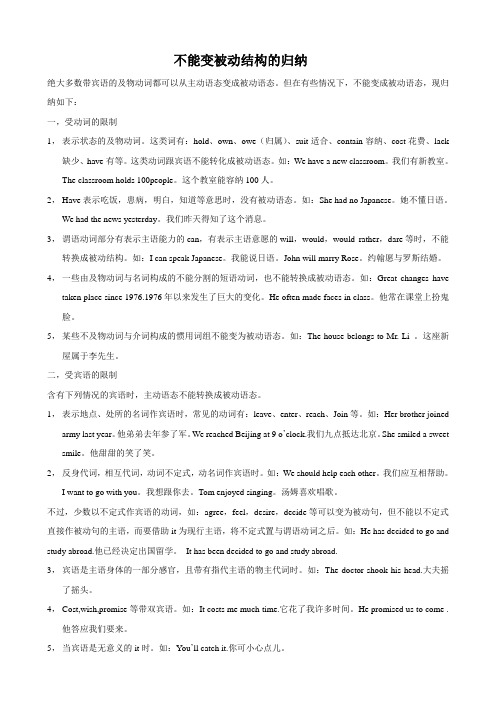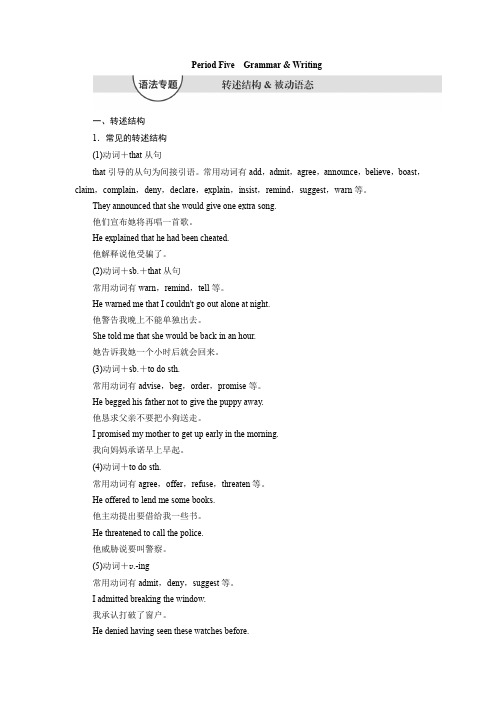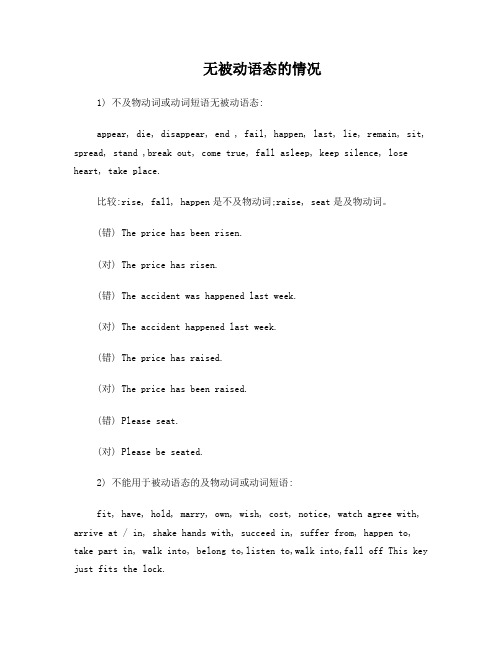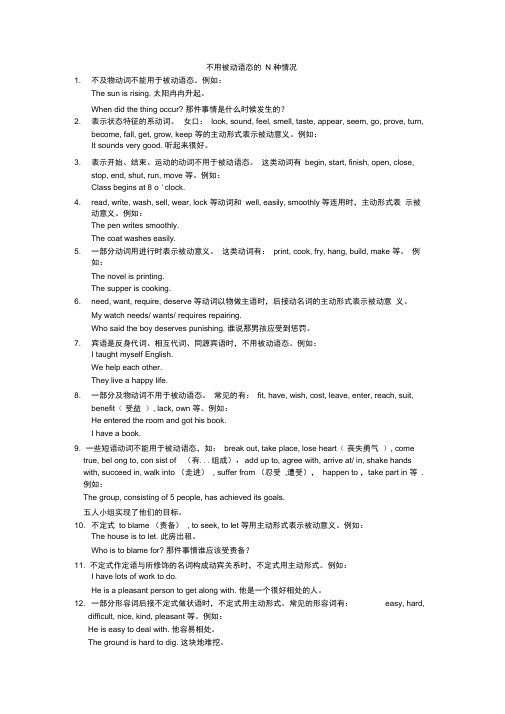不能用于被动语态的整理总结word版本
英语不能用被动语态的情况

不能用被动语态的情况初中语法:1) 不及物动词或动词短语无被动语态:appear, die disappear, end (vi. 结束), fail, happen, last, lie, remain, sit, spread, stand break out, come true, fall asleep, keep silence, lose heart, take place.After the fire, very little remained of my house.比较:rise, fall, happen是不及物动词;raise, seat是及物动词。
(错) The price has been risen.(对) The price has risen.(错) The accident was happened last week.(对) The accident happened last week.(错) The price has raised.(对) The price has been raised.(错) Please seat.(对) Please be seated.要想正确地使用被动语态,就须注意哪些动词是及物的,哪些是不及物的。
特别是一词多义的动词往往有两种用法。
解决这一问题唯有在学习过程中多留意积累。
2) 不能用于被动语态的及物动词或动词短语:fit, have, hold, marry, own, wish, cost, notice, watch agree with, arrive at / in, shake hands with, succeed in, suffer from, happen to, take part in, walk into, belong to This key just fits the lock.Your story agrees with what had already been heard.3) 系动词无被动语态:appear, be become, fall, feel, get, grow, keep, look, remain, seem, smell, sound, stay, taste, turnIt sounds good.4) 带同源宾语的及物动词,反身代词,相互代词,不能用于被动语态:die, death, dream, live, lifeShe dreamed a bad dream last night.5) 当宾语是不定式时,很少用于被动语态。
英语:不能变被动结构的归纳.doc

不能变被动结构的归纳绝大多数带宾语的及物动词都可以从主动语态变成被动语态。
但在有些情况下,不能变成被动语态,现归纳如下:一,受动词的限制1,表示状态的及物动词。
这类词有:hold、own、owe(归属)、suit适合、contain容纳、cost花费、lack 缺少、have有等。
这类动词跟宾语不能转化成被动语态。
如:We have a new classroom。
我们有新教室。
The classroom holds 100people。
这个教室能容纳100人。
2,Have表示吃饭,患病,明白,知道等意思时,没有被动语态。
如:She had no Japanese。
她不懂日语。
We had the news yesterday。
我们昨天得知了这个消息。
3,谓语动词部分有表示主语能力的can,有表示主语意愿的will,would,would rather,dare等时,不能转换成被动结构。
如:I can speak Japanese。
我能说日语。
John will marry Rose。
约翰愿与罗斯结婚。
4,一些由及物动词与名词构成的不能分割的短语动词,也不能转换成被动语态。
如:Great changes have taken place since 1976.1976年以来发生了巨大的变化。
He often made faces in class。
他常在课堂上扮鬼脸。
5,某些不及物动词与介词构成的惯用词组不能变为被动语态。
如:The house belongs to Mr. Li 。
这座新屋属于李先生。
二,受宾语的限制含有下列情况的宾语时,主动语态不能转换成被动语态。
1,表示地点、处所的名词作宾语时,常见的动词有:leave、enter、reach、Join等。
如:Her brother joined army last year。
他弟弟去年参了军。
We reached Beijing at 9 o’clock.我们九点抵达北京。
不能用于被动语态的几种情况总结

不能用于被动语态的几种情况总结Document number:PBGCG-0857-BTDO-0089-PTT1998不能用于被动语态的几种情况总结四川省阆中中学校任金石1、there be 结构及所有的不及物动词或动词短语充当谓语时,无被动语态。
:There are twelve moths in a year,Many of his songs have remained popular as ever,他的许多歌曲和以往一样仍然很流行。
Winning the medal is like a dream come true.获得奖牌好比梦想成真。
注:常见的不及物动词或动词短语有:appear, die, happen, lie(躺;位于), remain, occur, come true, break out, take place 等。
2、表示“状态”的谓语动词,如:last, hold, benefit, contain, equal, fit, join, mean, look like, consist of 等不能用被动语态。
:Each game lasts about an hour.每场比赛约一小时。
The committee consists of ten members.委员会由十人组成。
3、表示“归属”的动词,如have,own,belong to 等。
:We have three meals a day.我们一日吃三餐。
These islands belong to Spain.这些岛屿隶属西班牙。
4、表示“希望、意图”的动词,如wish,want,hope,like,love,hate等。
:But I hate autumn and winter。
但是我讨厌秋天和冬天。
5、宾语是反身代词或相互代词时谓语动词用主语语态,不能用被动语态。
:We should help each other.I found myself unable to speak.我发现自己说不出话了。
不能用于被动语态的动词

英语中不能用于被动语态的动词都有哪些?最佳答案你就记住一些动词应用中只能用主动表示被动。
1、Need, want, require, be worth后面接doing主动表被动。
The book is worth reading. 这本书值得一读。
The old building requires repairing. 这座古建筑需要修了。
Your hair wants/needs cutting (needs to be cut).你的头发该剪了。
2、不定式作定语,放在被修饰词后面,与前面被修饰的名词或代词有动宾关系,又在句子中与另一名词或代词有主谓关系,不定式要用主动表被动含义。
I have much work to do. 我有许多要做的事情。
(与work有动宾关系,与I有主谓关系)Tom is looking for a room to live in. Tom在找一间住的房间。
(与room有动宾关系,与Tom 有主谓关系)3、不定式修饰作表语和宾语补足语的形容词时,结构:主语+系动词+形容词+ 不定式;动词+宾语+形容词+不定式。
如果形容词是表示难易、利弊等含义,如:difficult, easy, comfortable, convenient(便利的,方便的), hard, cheap, expensive等,不定式用主动表被动。
The question is difficult to answer. 这个问题很难回答。
The work is easy to do. 这项工作很好做。
I found the car comfortable to ride in. 我觉得这种车很好坐。
4、在be to结构中的一些不定式:这种结构中的不定式通常应用主动表被动。
下列动词用不定式的主动形式表示被动意义:Who is to blame for starting the fire?这场火灾应由谁负责?You are to blame for the accident. 你应为这事受动责备。
2019-2020新课堂英语选修八北师大版讲义:Unit 22-5 Word版含答案

Period Five Grammar & Writing一、转述结构1.常见的转述结构(1)动词+that从句that引导的从句为间接引语。
常用动词有add,admit,agree,announce,believe,boast,claim,complain,deny,declare,explain,insist,remind,suggest,warn等。
They announced that she would give one extra song.他们宣布她将再唱一首歌。
He explained that he had been cheated.他解释说他受骗了。
(2)动词+sb.+that从句常用动词有warn,remind,tell等。
He warned me that I couldn't go out alone at night.他警告我晚上不能单独出去。
She told me that she would be back in an hour.她告诉我她一个小时后就会回来。
(3)动词+sb.+to do sth.常用动词有advise,beg,order,promise等。
He begged his father not to give the puppy away.他恳求父亲不要把小狗送走。
I promised my mother to get up early in the morning.我向妈妈承诺早上早起。
(4)动词+to do sth.常用动词有agree,offer,refuse,threaten等。
He offered to lend me some books.他主动提出要借给我一些书。
He threatened to call the police.他威胁说要叫警察。
(5)动词+v.-ing常用动词有admit,deny,suggest等。
I admitted breaking the window.我承认打破了窗户。
无被动语态情况

无被动语态的情况1) 不及物动词或动词短语无被动语态:appear, die, disappear, end , fail, happen, last, lie, remain, sit, spread, stand ,break out, come true, fall asleep, keep silence, lose heart, take place.比较:rise, fall, happen是不及物动词;raise, seat是及物动词。
(错) The price has been risen.(对) The price has risen.(错) The accident was happened last week.(对) The accident happened last week.(错) The price has raised.(对) The price has been raised.(错) Please seat.(对) Please be seated.2) 不能用于被动语态的及物动词或动词短语:fit, have, hold, marry, own, wish, cost, notice, watch agree with, arrive at / in, shake hands with, succeed in, suffer from, happen to, take part in, walk into, belong to,listen to,walk into,fall off This key just fits the lock.Your story agrees with what had already been heard.3) 系动词无被动语态:appear, be, become, fall, feel, get, grow, keep, look, remain, seem, smell, sound, stay, taste, turn It sounds good.4. 祈使句一般没有被动语态。
英语中不能用于被动语态的动词都有哪些

英语中不能用于被动语态的动词都有哪些?希望高手总结一下,最好每个带一个例句。
最佳答案你就记住一些动词应用中只能用主动表示被动。
1、Need, want, require(要求,需要), deserve(应得,值得), be worth值得),not bear(经不住) 后面接doing主动表被动。
The book is worth reading. 这本书值得一读。
The old building requires repairing. 这座古建筑需要修了。
These young seedlings will require/need looking after (=need to be looked after) carefully. 这些幼苗将需要小心的照管。
Your hair wants/needs cutting (needs to be cut). 你的头发该剪了。
2、不定式作定语,放在被修饰词后面,与前面被修饰的名词或代词有动宾关系,又在句子中与另一名词或代词有主谓关系,不定式要用主动表被动含义。
I have much work to do. 我有许多要做的事情。
(与work有动宾关系,与I有主谓关系)Tom is looking for a room to live in. Tom在找一间住的房间。
(与room有动宾关系,与Tom 有主谓关系)He has a family to support. 他要维持一个家庭。
(与family有动宾关系,与he有主谓关系)3、不定式修饰作表语和宾语补足语的形容词时,结构:主语+系动词+形容词+ 不定式;动词+宾语+形容词+不定式。
如果形容词是表示难易、利弊等含义,如difficult, easy, comfortable(舒适的), convenient(便利的,方便的), hard, cheap, expensive, 等,不定式用主动表被动。
完整word版,不用被动语态的N种情况

不用被动语态的N 种情况1. 不及物动词不能用于被动语态。
例如:The sun is rising. 太阳冉冉升起。
When did the thing occur? 那件事情是什么时候发生的?2. 表示状态特征的系动词。
女口:look, sound, feel, smell, taste, appear, seem, go, prove, turn,become, fall, get, grow, keep 等的主动形式表示被动意义。
例如:It sounds very good. 听起来很好。
3. 表示开始、结束、运动的动词不用于被动语态。
这类动词有begin, start, finish, open, close,stop, end, shut, run, move 等。
例如:Class begins at 8 o 'clock.4. read, write, wash, sell, wear, lock 等动词和well, easily, smoothly 等连用时,主动形式表示被动意义。
例如:The pen writes smoothly.The coat washes easily.5. 一部分动词用进行时表示被动意义。
这类动词有:print, cook, fry, hang, build, make 等。
例如:The novel is printing.The supper is cooking.6. need, want, require, deserve 等动词以物做主语时,后接动名词的主动形式表示被动意义。
My watch needs/ wants/ requires repairing.Who said the boy deserves punishing. 谁说那男孩应受到惩罚。
7. 宾语是反身代词、相互代词、同源宾语时,不用被动语态。
例如:I taught myself English.We help each other.They live a happy life.8. 一部分及物动词不用于被动语态。
- 1、下载文档前请自行甄别文档内容的完整性,平台不提供额外的编辑、内容补充、找答案等附加服务。
- 2、"仅部分预览"的文档,不可在线预览部分如存在完整性等问题,可反馈申请退款(可完整预览的文档不适用该条件!)。
- 3、如文档侵犯您的权益,请联系客服反馈,我们会尽快为您处理(人工客服工作时间:9:00-18:30)。
不能用于被动语态的总结
1、there be 结构及所有的不及物动词或动词短语充当谓语时,无被动语态。
There are twelve months in a year.
The war broke out in 1937.(break out, 爆发)
The story took place in a small mountain village. (take place,发生)
常见的不及物动词或动词短语有:appear, die, happen, lie(躺;位于), remain, occur, come true, break out, take place 等。
2、表示“状态”的谓语动词,如:last, hold, keep, suit, remain, look like, consist of 等不能用被动语态。
The hall can hold more than 500 people. (hold,容纳)
The project lasted 14 years and cost 1 billion US dollars. (last,延续)
No dish suits all tastes. (suit,适合)
The committee consists of ten members.委员会由十人组成。
3、表示“归属”的动词,如have,own,belong to 等。
We have three meals a day.我们一日吃三餐。
We have six classes every day. (have,上课)
Our success belongs to all the people. 我们的成功属于每一个人。
(belong to, 属于) 4、表示“希望、意图”的动词,如wish,want,hope,like,love,hate等。
But I hate autumn and winter。
但是我讨厌秋天和冬天。
5、宾语是反身代词或相互代词时谓语动词用主语语态,不能用被动语态。
We should help each other.(宾语为相互代词)
I found myself unable to speak.我发现自己说不出话了。
(宾语为反身代词)
6、宾语是同源宾语、不定式、动名词等谓语动词不用被动语态。
In the past, they lived a miserable life. (同源宾语)
They don’t allow smoking. (动名词)
7、主动形式表示被动意义。
①当某些连系动词,如feel、look、smell、taste、sound等后面接形容词时。
The fish smells good .鱼闻起来很香。
The steel feels very cold. 钢铁摸起来很凉。
This kind of food tastes good. 这种食物尝起来味道很好。
②当burn(燃烧)、clean(打扫)、cook(煮)、cut(切)、read(读)、sell(销售)、wash(洗)、wear(穿)、write(写)等表示主语内在“品质或性能”的动词,其后跟一个副词如well(好)、easily(容易地)、perfectly(十分地)等连用,描绘事物的特性,用主动表被动,结构是主语+动词+副词。
sell well( 畅销), last well(持久), wash well(耐洗), write well(写起来流畅);
wash easily(易洗), break easily(易折), write smoothly(写起来流畅), light easily(易燃)。
The book sells well.这种书很畅销。
The pen writes smoothly. 这钢笔写起来流畅。
This kind of cloth washes easily. 这种布料容易洗。
The match does not light easily. 火柴不易点燃。
③当动词表示“开始、结束、关、停、转、启动”等意义,说明主语的意志时。
The door won’t lock. 门锁不上。
The car won’t start. 车就是发动不起来。
④deserve, need, require, want后面的动名词表示被动含义。
The room needs cleaning (needs to be cleaned).这房间需要打扫。
The old building requires repairing (requires to be repaired). 这座古建筑需要修了。
Your hair wants/needs cutting (wants to be cut).你的头发该剪了。
注:这些动词后的动名词可以替换成动词不定式的被动形式。
⑤be worth doing 用主动形式表示被动意义。
This book is well worth reading.
8、meet 遇见;碰到
I met him in the street at eight yesterday morning.
昨天早晨8点钟我在街上碰到他。
注:meet表迎接时有被动语态。
如: I was met at the airport by all my old friends in that city. 该城老友全都到机场迎接我。
9、weigh 物体所称重量为……
This stone weighs 200 tons. 这块石头重200吨。
当weigh表示“称……”时有被动语态。
如: This stone will be weighed this evening. 今晚这块石头将被称出重量。
10、open店铺开门营业
This shop doesn't open on Sunday. 这家商店周日不开门营业。
当open表“打开; 开幕; 开张”时有被动语态。
如: This door was opened by Li Ping. 门是被李平打开的。
This sports meeting will be opened next week.运动会将于下周开幕。
11、come into being 形成; 产生(不可用于被动语态或进行时)
When did the Roman Empire come into being? 罗马帝国是什么时候形成的?
Their army came into being in 1938. 他们军成立于1938年。
12、happen为不及物动词,不能用于被动语态。
例如,表示"这故事发生在去年。
”不能说:The story was happened last year.可以说:The story happened last year. happen为短暂性动词,不能与表示一段时间的状语连用。
例如,表示"这事发生一年了。
"不能说:This happened for one year.可以说:This happened one year ago.
happen一般用来强调某事发生的偶然性。
要表示事先安排或有准备的事情或活动,则不能用happen,而要用take place。
例如:
A sports meeting took place(=was held) in our school last week.上周我校举行了运动会。
(不能说:A sports meeting happened in our school last week.)
13、不定式作定语,放在被修饰词后面,与前面被修饰的名词或代词有动宾关系,又在句子中与另一名词或代词有主谓关系,不定式要用主动表被动含义。
I have much work to do. 我有许多要做的事情。
(与work有动宾关系,与I有主谓关系)
Tom is looking for a room to live in. Tom在找一间住的房间。
(与room有动宾关系,与Tom 有主谓关系)
He has a family to support.他要维持一个家庭。
(与family有动宾关系,与he有主谓关系)。
